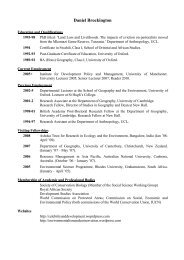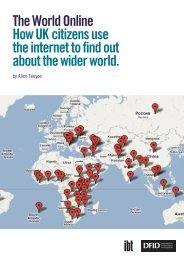World
Viewing the world - Full report
Viewing the world - Full report
- No tags were found...
Create successful ePaper yourself
Turn your PDF publications into a flip-book with our unique Google optimized e-Paper software.
H. ConclusionTelevision output that portrays the countries of thedeveloping world does not constitute a programmegenre, and never has done. It has a place in news, currentaffairs, drama, documentaries, discussion programmes,appeals, and occasional ‘events’ like Comic Relief. Yet itis sometimes treated as a genre of its own for two mainreasons:1) it is associated with a certain style of problem-based,sometimes campaigning, factual programmefamiliar on television of the ’70s and ’80s on strandslike <strong>World</strong> In Action, This Week, Global Report, FirstTuesday, Panorama, The <strong>World</strong> About Us, and manyindividual series besides.2) it is an area of programming that in the ’90s hascome to represent something of a puzzle.H.1.The PuzzleThis puzzle is clearly summed up in the findings of thissurvey. All the 38 interviewees believe television has a rolein informing people about the developing world, as anatural part of its ‘window on the world’ function.Almost all the interviewees (33 out of 38) feel this roleshould be played out on the popular mainstreamchannels, not simply the specialist niche channels. Allinterviewees claim there is a place for this programmingon their own channels/output, and almost all include aplace for hard development issues.However, the majority of interviewees do not believethe public want to watch programmes about thedeveloping world, and therein lies the puzzle. In the daysof the old BBC-ITV duopoly, programmes could becommissioned regardless of mass audience interest if thesubject was deemed important. It was seen as acting inthe public interest to do this. But now, in the multichannelera, with a vastly-increased choice of viewingoptions available, the balance of power has shifted to theaudience. Channels that don’t fiercely compete to win anaudience will fail to justify their existence.This study indicates that the traditional publicservice ethos of British television is still strongly presentin the thinking of industry decision-makers, and thedeveloping world is high up on the “ought-to” list. But inthe current battle for audience share and survival thisarea of output has come to be regarded as a high ratingsrisk and therefore a problem.Is there a way to fulfil television’s perceived socialresponsibility and satisfy a present-day audience at thesame time? That is the conundrum.H.2.The PressuresIf the overriding concern for senior decision-makersmust be audience share, the programme-makers’ centralconcern is getting ideas commissioned in the first place.And a number of factors in the commissioning processare perceived to work against output on the developingworld, especially in non-news programming:Developing and researching ideas in developingcountries can be costly to a producer, but without thisprocess there may not be enough substance to make aprogramme proposal convincing or tangible, especially ifa commissioning editor is unfamiliar with the countryconcerned.The commissioning process has become morecentralised at the top, and producers feel frustrated notto be able to communicate directly with the finaldecision-makers. Some of the topmost commissionersexpress dissatisfaction with the quality of ideas they areoffered, and admit there is little opportunity forspontaneous, creative discussion about projects acrossthe ranks of middle-commissioners. Areas ofprogramming considered risky, like output on thedeveloping world, are the first to be squeezed out in thishierarchical system.The very fact that stories about the developing worldare seen as risky leads to self-censoring among producers.Some for whom this was once a speciality have movedright away from this area and no longer maintaincontacts in these countries. Producer passion in this areahas not been encouraged.Commissioning structures apart, there are certaincultural assumptions prevalent in the televisionindustry, and apparent in interview responses, that donot favour output on the developing world. Theseassumptions do not appear to be based on conclusiveresearch. They include:Most British viewers only want to watch domestictopics. This fact is disputed. BBC News claim theirresearch finds this is not the case. Carlton TV points toresearch that claims it is. While a senior advertisingdirector considers that “maybe it’s the perception offoreign programmes rather than the programmes174 DFID – July 2000





